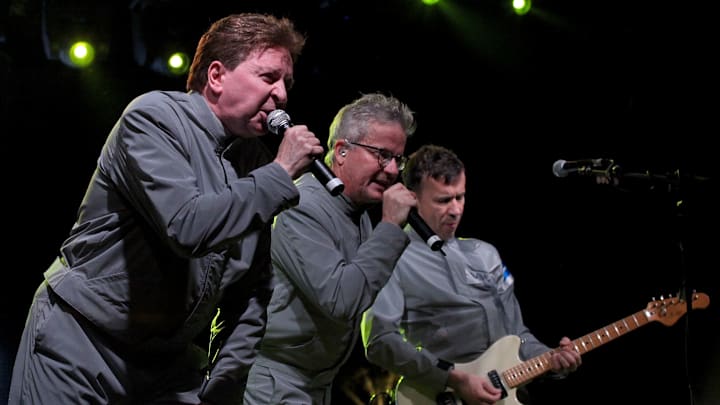Before "Whip It" and his Devo days, Gerald Casale had been part of the Numbers Band as a bass guitarist, where he stirred up tension with his proposal to infuse their music with elements from advertising jingles and other aspects of "low culture." Departing from the Numbers Band and after completing his studies, Casale pursued art at Kent State University, focusing on fine/performing arts and fashion-related fields. In the late 1960s, he identified as a hippie until the tragic May 4, 1970 shootings at Kent State.
Personally acquainted with two of the victims, Jeffrey Miller and Allison Krause, and in close proximity to Krause during the shooting, Casale recounted this event as a turning point, marking the end of his hippie phase and transition into a more punk attitude. "Until then I was a hippie. I thought that the world is essentially good. If people were evil, there was justice and that the law mattered. All of those silly naïve things. I saw the depths of the horrors and lies and the evil."
Gerald Casale noted how the media were highly complicit in creating this social climate of moral panic: "In the paper that evening, the Akron Beacon Journal, said that students were running around armed and that officers had been hurt. So deputy sheriffs went out and deputized citizens. They drove around with shotguns and there was martial law for ten days...It was open season [on] the students."
Devo, Kent State, and violent moral panic
Casale described the unfolding scenario as plainly nightmarish: "We lived in fear. Helicopters surrounding the city with hourly rotating runs out to the West Side and back downtown. All first amendment rights are suspended at the instance when the governor gives the order. All of the class action suits by the parents of the slain students were all dismissed out of court because once the governor announced martial law, they had no right to assemble."
Collaborating with Bob Lewis, Casale utilized the aftermath of the shooting to formulate the concept of De-evolution, laying the groundwork for the birth of Devo in 1973.
The founders of Devo and The Pretenders were present during that harrowing event, using it as a catalyst for creativity. Casale summed up the inspiration in an interview now featured on Kent State's website: "I had always been making art and music but the events of May 4th and beyond galvanized my creativity, infusing it with an existential anger and urgency that would otherwise not have happened. In short Devo and the idea of De-evolution as a manifesto would not exist without that defining historic trauma I experienced."
Other musical figures may not have attended Kent State or directly known attendees but were highly influenced by the event. For example, Jello Biafra, formerly of the Dead Kennedys, notes on his bio: "...The Vietnam War, Chicago 7 trial, Kent State massacre, and the Denver smog problem convince[d] Biafra that corrupt, violent governments and corporations...should be fought, not trusted."
On one of his spoken word album tracks, Biafra also refers to one of his 6th-grade teachers having "the gall" to start the class by praising the National Guard for the Kent State shooting, and specifically references it in the song "Wish I Was In El Salvador."
Of course, more well known to average classic rock fans is the song "Ohio" by Crosby, Stills, Nash & Young, which is all about the shooting. Still, that it basically spawned the cult band Devo is perhaps the most interesting musical story related to the Kent State Massacre. They are also no doubt deserving recognition as a band that redefined rock music.
It's all a testament to their resilience and the power of turning adversity into something positive, a legacy that fans should always remember. It's also an event that has relevance to the world now, just as much as back then.
